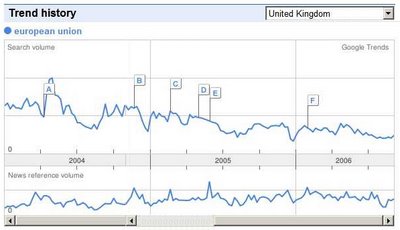 Poor little Margot. As communications commissioner, her job is to stoke up enthusiasm for the love of her life, the distinctly jaded European Union.
Poor little Margot. As communications commissioner, her job is to stoke up enthusiasm for the love of her life, the distinctly jaded European Union. To that effect, as she writes in her latest blog posting, she arranged a massive jolly in the "beautiful city of Bergamo", in Northern Italy. This was for hundreds of representatives of "civil society organisations" to discuss "how to consult and communicate with citizens."
Writes the fragrant one, this was "one of several conferences we are holding as a follow up to our proposal for a new communications policy". She tells us she wanted to get a number of "concrete ideas" for how to improve our interaction with civil society, including how to use the internet better.
Her problem though is that, as we have already noted, people just don't want to know. But tipped off by UKIP forum, we now seem to have evidence from a remarkable new Google service called search trends.

The service tells you the search traffic for a particular subject, so we entered "European Union", measuring searches originating in the UK for the last three years. And, as the graph above shows, while the news stories generated have been fairly static, the number of searches have been declining for some considerable time.
Contrary to expectations, however, the decline did not start with the Dutch and French referendum results. In fact, the trend seems to be downwards throughout the preceding year.
 Repeating the same exercise for all regions gives the same picture, and most European countries also show a downwards trend – although interpretation is difficult as the bulk of searches will not be carried out in English.
Repeating the same exercise for all regions gives the same picture, and most European countries also show a downwards trend – although interpretation is difficult as the bulk of searches will not be carried out in English.As an added curiosity, the system also shows the relative traffic from different cities in the UK. In the top ten, number one is Cardiff. Glasgow is number two and then, inexplicably, Edinburgh is ten. London does not even feature on the list.
Nevertheless, as to the main graph, our own sense of a lack of interest in the "project" seems to have some support from these data, suggesting that, in our waning interest, we are not alone.
COMMENT THREAD
